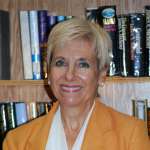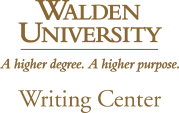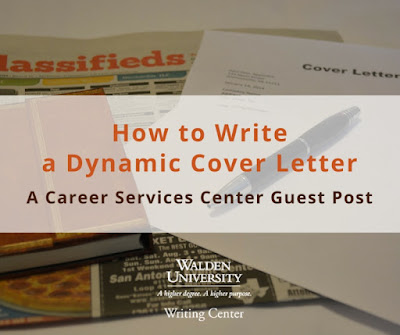Showing posts with label Guest Post. Show all posts
Student Spotlight: Breanne Ahearn, Richard W. Riley College of Education and Leadership
Monday, April 17, 2017
Expert Advice
,
Guest Post
,
Reading & Writing
,
Social Change
,
Student Spotlight
No comments
The Walden University Writing Center is privileged to work with talented students. In the Student Spotlight Series, we aim to support incredible work our students do, both in and out of the classroom. The goal of the Student Spotlight Series is to provide the Walden community with a place to build bridges and make connections by developing shared understanding of the diverse and varied student journey. Students share stories about their writing process, their efforts towards social change, and their motivations for pursuing higher education. We ask questions, and students generously answer.This Student Spotlight features Breanne Ahearn, student of the Richard W. Riley College of Education and Leadership.
 |
| The WUWC Student Spotlight Series: Building Bridges. Making Connections. |
I’m originally from California, a small beach town just north of San Diego, to be exact. I spent a better part of my life enjoying things like the playing in the sand, spending time with friends, and bettering myself overall. As I’ve grown older, I have found those passions have only expanded. I’m a big fan of personal fitness. I love marital arts as a workout tool. I love to mediate, do yoga, spend time at the beach, hike mountain sides, and spend time with my friends and my best friend who is also my husband.
 |
| Best Friend and Spouse |
What is your educational background?
My educational background is bit diverse… I began college several years after many of my friends. I started as a pre-med major and, after having completed a number of classes in my concentration at the community college level, I realized I really wasn’t ready to take the next step and head off to a four-year university in Monterey Bay, California. So I stayed home and took a class in radio fundamentals (just for the heck of it). My first day, I was hooked. I was thrown (metaphorically) into the deep end of radio and found myself on the air my first day of class. Our campus radio station was like no other; we were Federal Communications Commission regulated and CNN News affiliated. In other words, there was no goofing around or child’s play allowed.
I started in the news division then worked my way up over the 4 semesters I was there to having my own show then becoming the station manager. I changed my major from Pre-Med to Communications and, after creating an award winning and nationally recognized radio documentary, I left California and finished my undergraduate degree in Atlanta, GA. While I was finishing my last two semesters of college, I was offered a job with a brand new radio news station with the second largest radio company in the U.S. While there, I took a leave of absence and moved to London, England, where I studied Television Journalism at Goldsmiths, University of London. After a year in the program, I had my Master of Arts degree and decided I wanted to continue my education into the doctoral field. Over the years, I have taught students, peers, colleagues, and I decided, instead of taking the journalism route as I have in the past, that I would study my doctorate under the education concentration and bend my journalism practices into teaching.
 |
| Breanne's must-haves for a successful day at work |
I grew up a student with a learning disability and, when you're told from a young age that you can’t do something or that the odds are not in your favor, you either accept defeated or you refuse to give up. In my career I am able to bend my practices in a direction that works best for me but, while at Walden, that hasn’t been the case. I have been forced to address issues that have long plagued my studies (statistics) and had to completely relearn how to write. I have used the support of my adviser, the Writing Center, and my professors with each new challenge. Not only has that support group been there to help me when I have a simple question or am completely off the mark, but the support I receive at home also contributes to my “I refuse to give up” attitude.
 |
| An example of the daily life of Breanne's career in broadcast journalism |
Since my time in community college I have found myself aiding others in their studies. There are areas I succeed at and there are areas that I require additional learning. However, I know, with the skills I have been taught, both at Walden and in my career, that I have the ability, knowledge, and experience to walk into a classroom or an office full of individuals who have that desire to learn more and to teach them. I don’t plan on leaving a newsroom just yet but I do plan on entering into a classroom and teaching the next generation while I continue to do what I love.
In what ways do you hope your dissertation/capstone will contribute to positive social change? Why is that important to you?
It is important for students in the communications concentration to understand the newest and most effective ways of learning in today's digital age. With that said, some four year universities continue to teach behind the times, and their students are suffering upon graduation. Many of them lack the experience to gain employment. Some are successful with getting a job only to find their education is in no way an aid in their chosen field and they must learn tools to be effective in today's field. In today’s world journalist are called amateurs, fake news writers, liars. A positive social change needs to take place, and it needs to start in the classroom. The only way for that to occur is if we, as educators, teach the most up to date and highly sought after practices.
The
Walden University Writing Center provides information and assistance to students
with services like live chat, webinars, course visits, paper reviews,
podcasts, modules, and the writing center webpages. Through these
services they provide students assistance with APA, scholarly writing,
and help students gain skills and confidence to enhance their scholarly
work.
.png)
Never miss a new post; Opt-out at any time
Where, Oh Where, to Begin? Expert Advice on Starting Your Proposal
This month on the blog, we're featuring a guest post by dissertation editor, coach, and author Noelle Sterne.
You’ve
reached the first dissertation milestone—approval of your prospectus. Great! And
you can’t wait to plunge into the next step, writing the proposal. But now, somehow,
it’s not working. With all the best intentions and surrounded by all the
scholarly materials, you may be spending long fruitless hours in your study or
the library. The days are slipping away, your friends are out eating pizza, and
your family wonders what you’re really doing in all those solitary hours. You
feel paralyzed.
To
cheer yourself up, you remember that the
proposal becomes the first three chapters of the real dissertation or doctoral
study. But this fact offers little consolation. A completed proposal seems
like a sky-high wall with not even a step stool in sight. Where is that danged
first step?
Break the Rules
Here is one remedy. Contrary to the
King's advice to the White Rabbit in Alice’s
Adventures in Wonderland, you don't have to
start at the beginning and keep going until you reach the
end. If you follow this dictum, you may only increase your fears
and tremors.
In my academic coaching practice, I
advise clients not to start at the beginning--that is, with Chapter 1, the introduction. Why? This chapter requires a
concise overview of your topic and the
literature. You must be highly
familiar with both. But many students don't get to know what they're really
writing about until they've been living with their capstone for
several months.
How to Start
So, here’s first trick to break your
paralysis: Make separate files for each chapter. Use the university’s requisite
chapter names and headings (from the capstone manual or handbook), or the
templates in the capstone section of the
university website. Once you create the files
you’ll feel more organized. You’ll also gain a sense of accomplishment. You can
keep throwing notes into these files as new materials surface and brilliant
thoughts occur to you for each chapter.
The second trick: Start writing by choosing
something relatively straightforward. No doctoral divine lightening will strike
if you start in the middle, or later. I
often recommend that students start with Chapter 3: Methods. In this chapter
you describe who's in the study and how you will study
them—your population and sample, and what you're going to put them through (experiments,
questionnaires, or interviews). Your writing style
here should be direct, with precise descriptions of the steps you'll take
to gather information for your later conclusions.
Dissertation Brownies
It's kind
of like a recipe for dissertation
brownies—as in this example student’s paragraph:
First, I will create a flyer for recruiting students to complete my questionnaire on their most effective study habits. Then, I will seek permission from the Office of Student Affairs to post the flyer on campus bulletin boards. When students respond to my contact information, I will send them the letter of introduction to the study and the informed consent to participate. Next, I will . . .
In the margin of the
paragraph above, the student's chair commented, "What's your authority for bypassing the
university's institutional review board?" The student hastened to add this
information in the next draft. What you write may not be the final draft, and
shouldn't be. Accept this, and recognize that you’ve made progress in writing
something.
The Advantages
Writing anything loosens your fear-frozen
mind so you think more creatively about
the steps you need to take. Let’s say you were writing the example paragraph from
above—you need to think about where to recruit, who to recruit, when, and many other considerations. As you visualize the actual steps, think about
what your actual recruitment flyer and
letter of intro to the study will say. This is a great opportunity to actually
draft the flyer, letter, and informed consent form—you're going to need them as appendices. Then, possibly to your elated
shock, you'll have written more!
When you see the paragraphs
mounting, you will feel greater confidence to keep writing. A
few days after I guided my client Rod to start with his third chapter, he
emailed me: "I finally got to a double digit page numbers! A
miracle!" I congratulated him for reaching page 10. Practice makes progress.
As you keep going, you'll likely
find that related ideas pop up. Say you’ve decided to study the study habits of
red-headed students over six feet tall. You suddenly realize that another study
could be done on the study habits of enrolled redheads under six feet. Here's
where you click to your largely empty file of Chapter 5: Discussion,
Conclusions, and Recommendations, and type the new idea under the subhead of suggestions
for future research. You’ve written more!
Starting your proposal with
something easier isn't a black mark on your moral fiber. It's
simply a way to get moving. So, choose a section or subsection that feels
doable, even obvious. Tell yourself, "It's all got to get done anyway."
Now . . . start writing.

For 30 years, dissertation editor, coach, and author Noelle Sterne, Ph.D. (Columbia University) has helped doctoral candidates complete their dissertations. Her new handbook addresses their overlooked but crucial nonacademic difficulties: Challenges in Writing Your Dissertation: Coping with the Emotional, Interpersonal, and Spiritual Struggles (Rowmand & Littlefield Education, September 2015). Visit her website at trustyourlifenow.com.
.png)
Never miss a new post; Opt-out at any time
How to Write a Dynamic Cover Letter (A Career Services Center Guest Post)
As I read last week’s blog post by Amber Cook about engaging your audience through "reading the room," I thought about the one-page cover letter, a
document that we often don’t think about in academia.
You put so much effort into writing academic papers; how do you make the shift to
writing a one-page cover letter that engages your audience--the hiring manager?
Is Your Resume Ready for Your Next Career Move? A Career Services Guest Post
This week, we're excited to offer a special guest post by Career Services Advisor Denise Pranke!
As a Walden Career Services Advisor, I review and provide feedback on hundreds of resumes every year. Just as there are strategies for writing an academic paper, there are strategies for crafting a strong resume. Whether you are transitioning into a new field, re-entering the workforce, looking for a leadership position, or targeting a job similar to your previous employment, you can create a resume that clearly and concisely communicates your unique qualifications, accomplishments, and professional focus.
Don’t forget to edit and proofread! Editing and proofreading are essential. Nothing will eliminate your resume from consideration faster than poor editing or misspelled words. For proofreading strategies, check out the Writing Center’s Proofreading resource.

Denise Pranke is a career services advisor in Walden's Career Services Center. Denise also writes for the Walden University Career Services Blog.
As a Walden Career Services Advisor, I review and provide feedback on hundreds of resumes every year. Just as there are strategies for writing an academic paper, there are strategies for crafting a strong resume. Whether you are transitioning into a new field, re-entering the workforce, looking for a leadership position, or targeting a job similar to your previous employment, you can create a resume that clearly and concisely communicates your unique qualifications, accomplishments, and professional focus.
 |
| "Resume - Glasses" (c) Flazingo Photos (license) |
Start with self-assessment. Reflect on your strengths. What are you most proud of in your academic and professional accomplishments?
Have clear job target in mind. With a clear job target, you can tailor your resume to highlight your skills and accomplishments that match the required qualifications for the position.
Create a clearly organized document. Use clear section headers and consistent formatting. Avoid redundant statements and long, unorganized lists of duties and responsibilities.
Include a professional summary section that conveys your professional reputation or brand. This section should include three to five sentences that summarize your relevant experience, skills, and professional focus. For example:
Dedicated Community Leader and Adult Educator
Extensive experience in community based nonprofit management. Committed to building engaged communities around common goals through dialogue, education, and partnerships. Hold M.S. in Nonprofit Management and Leadership; pursuing DBA with specialization in Social Impact Management.
Write accomplishment and skill statements relevant to the position. In Career Services, we call these CAR statements. CAR statements include a challenge, action, and result. Here are three examples that take a weak statement and turn it into a CAR statement.
| • Mission-Focused Approach | • Social Media Communications | |
| • Program Development | • Fund Raising | |
| • Data-Driven Program Evaluation | • Staff & Volunteer Training |
Write accomplishment and skill statements relevant to the position. In Career Services, we call these CAR statements. CAR statements include a challenge, action, and result. Here are three examples that take a weak statement and turn it into a CAR statement.
| Weak: | • Increased volunteer hours | |
| Strong: | • Increased volunteer hours in tutoring, administrative support, and facility maintenance from 520 hours to 1250 hours over 6 months by collaborating with local businesses |
| Weak: | • Reduced costs | |
| Strong: | • Implemented a new inventory tracking system resulting in the elimination of duplicate orders and a yearly savings of over $30,000 |
| Weak: | • Improved safety | |
| Strong: | • Improved safety by enhancing the training curriculum and implementing a safety checklist which reduced the number of accidents by 60% over a 12-month period |
Here are additional resources to help you get your resume ready for your next career move:
- OptimalResume System, an excellent resume building tool that offers resume samples and templates.
- Archived Webinars:
- “Crafting Effective Resumes”
- The OptimalResume Webinar Series provides guidance on how to use the OptimalResume system
- Action verbs resource
- Parallel construction resource

Denise Pranke is a career services advisor in Walden's Career Services Center. Denise also writes for the Walden University Career Services Blog.
Subscribe to:
Posts
(
Atom
)





